Elevated level of mitochondrial reactive oxygen species via fatty acid β-oxidation in cancer stem cells promotes cancer metastasis by inducing epithelial-mesenchymal transition
- PMID: 31196164
- PMCID: PMC6567550
- DOI: 10.1186/s13287-019-1265-2
Elevated level of mitochondrial reactive oxygen species via fatty acid β-oxidation in cancer stem cells promotes cancer metastasis by inducing epithelial-mesenchymal transition
Abstract
Background: Cancer stem cells (CSCs) play a critical role in tumor development and progression and are involved in cancer metastasis. The role of reactive oxygen species (ROS) in CSCs and cancer metastasis remains controversial. The aim of the present study was to investigate the correlation between ROS level of CSCs and cancer metastasis and to explore the possible underlying molecular mechanisms.
Methods: Four different cell lines were used to isolate tumor spheres and to analyze intrinsic properties of tumor sphere cells including proliferation, self-renewal potential, differentiation, drug-resistance and cancer metastasis in vitro and in vivo. ROS assays were used to detect the intracellular ROS level of tumor spheres cells. Gene expression analysis and western blot were used to investigate the underlying mechanisms of ROS in regulating cancer metastasis.
Results: Tumor spheres possessed the characteristic features of CSCs, and ROS-high tumor spheres (RH-TS) displayed elevated mitochondrial ROS level exclusively drove metastasis formation. The gene expression analysis showed elevated fatty acid β-oxidation, downregulation of epithelial marker upregulation of mesenchymal markers, and the activation of MAP kinase cascades. Furthermore, 14 up-regulated genes in RH-TS cells were associated with reduced overall survival of different cancer patients.
Conclusions: Our findings demonstrate that CSCs characterized by elevated mitochondrial ROS level potentiate cancer metastasis. Mechanistically, elevated mitochondrial ROS via fatty acid β-oxidation, activates the MAPK cascades, resulting in the epithelial-mesenchymal transition (EMT) process of RH-TS cells, thereby potentiating caner invasion and metastasis. Therefore, _targeting mitochondrial ROS might provide a promising approach to prevent and alleviate cancer metastasis induced by RH-TS cells.
Keywords: Cancer metastasis; Cancer stem cells; Epithelial-mesenchymal transition; Mitochondria; ROS; Tumor sphere.
Conflict of interest statement
The authors declare that they have no competing interests.
Figures
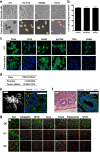
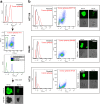
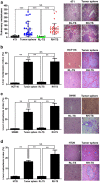
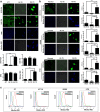
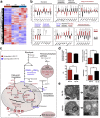
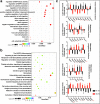
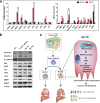

Similar articles
-
Coexpression of gene Oct4 and Nanog initiates stem cell characteristics in hepatocellular carcinoma and promotes epithelial-mesenchymal transition through activation of Stat3/Snail signaling.J Hematol Oncol. 2015 Mar 11;8:23. doi: 10.1186/s13045-015-0119-3. J Hematol Oncol. 2015. PMID: 25879771 Free PMC article.
-
FOXM1-Induced PRX3 Regulates Stemness and Survival of Colon Cancer Cells via Maintenance of Mitochondrial Function.Gastroenterology. 2015 Oct;149(4):1006-16.e9. doi: 10.1053/j.gastro.2015.06.007. Epub 2015 Jun 17. Gastroenterology. 2015. PMID: 26091938
-
MCUR1 facilitates epithelial-mesenchymal transition and metastasis via the mitochondrial calcium dependent ROS/Nrf2/Notch pathway in hepatocellular carcinoma.J Exp Clin Cancer Res. 2019 Mar 25;38(1):136. doi: 10.1186/s13046-019-1135-x. J Exp Clin Cancer Res. 2019. PMID: 30909929 Free PMC article.
-
_targeting redox regulation and autophagy systems in cancer stem cells.Clin Exp Med. 2023 Sep;23(5):1405-1423. doi: 10.1007/s10238-022-00955-5. Epub 2022 Dec 6. Clin Exp Med. 2023. PMID: 36473988 Review.
-
Induction of metastasis, cancer stem cell phenotype, and oncogenic metabolism in cancer cells by ionizing radiation.Mol Cancer. 2017 Jan 30;16(1):10. doi: 10.1186/s12943-016-0577-4. Mol Cancer. 2017. PMID: 28137309 Free PMC article. Review.
Cited by
-
Insights into Metabolic Reprogramming in Tumor Evolution and Therapy.Cancers (Basel). 2024 Oct 17;16(20):3513. doi: 10.3390/cancers16203513. Cancers (Basel). 2024. PMID: 39456607 Free PMC article. Review.
-
Mitochondriopathies as a Clue to Systemic Disorders-Analytical Tools and Mitigating Measures in Context of Predictive, Preventive, and Personalized (3P) Medicine.Int J Mol Sci. 2021 Feb 18;22(4):2007. doi: 10.3390/ijms22042007. Int J Mol Sci. 2021. PMID: 33670490 Free PMC article. Review.
-
Identification and validation of anoikis-related lncRNAs for prognostic significance and immune microenvironment characterization in ovarian cancer.Aging (Albany NY). 2024 Jan 15;16(2):1463-1483. doi: 10.18632/aging.205439. Epub 2024 Jan 15. Aging (Albany NY). 2024. PMID: 38226979 Free PMC article.
-
TOMM20 as a potential therapeutic _target of colorectal cancer.BMB Rep. 2019 Dec;52(12):712-717. doi: 10.5483/BMBRep.2019.52.12.249. BMB Rep. 2019. PMID: 31818360 Free PMC article.
-
Integrated lipidomics and proteomics reveal cardiolipin alterations, upregulation of HADHA and long chain fatty acids in pancreatic cancer stem cells.Sci Rep. 2021 Jun 24;11(1):13297. doi: 10.1038/s41598-021-92752-5. Sci Rep. 2021. PMID: 34168259 Free PMC article.
References
Publication types
MeSH terms
Substances
LinkOut - more resources
Full Text Sources

